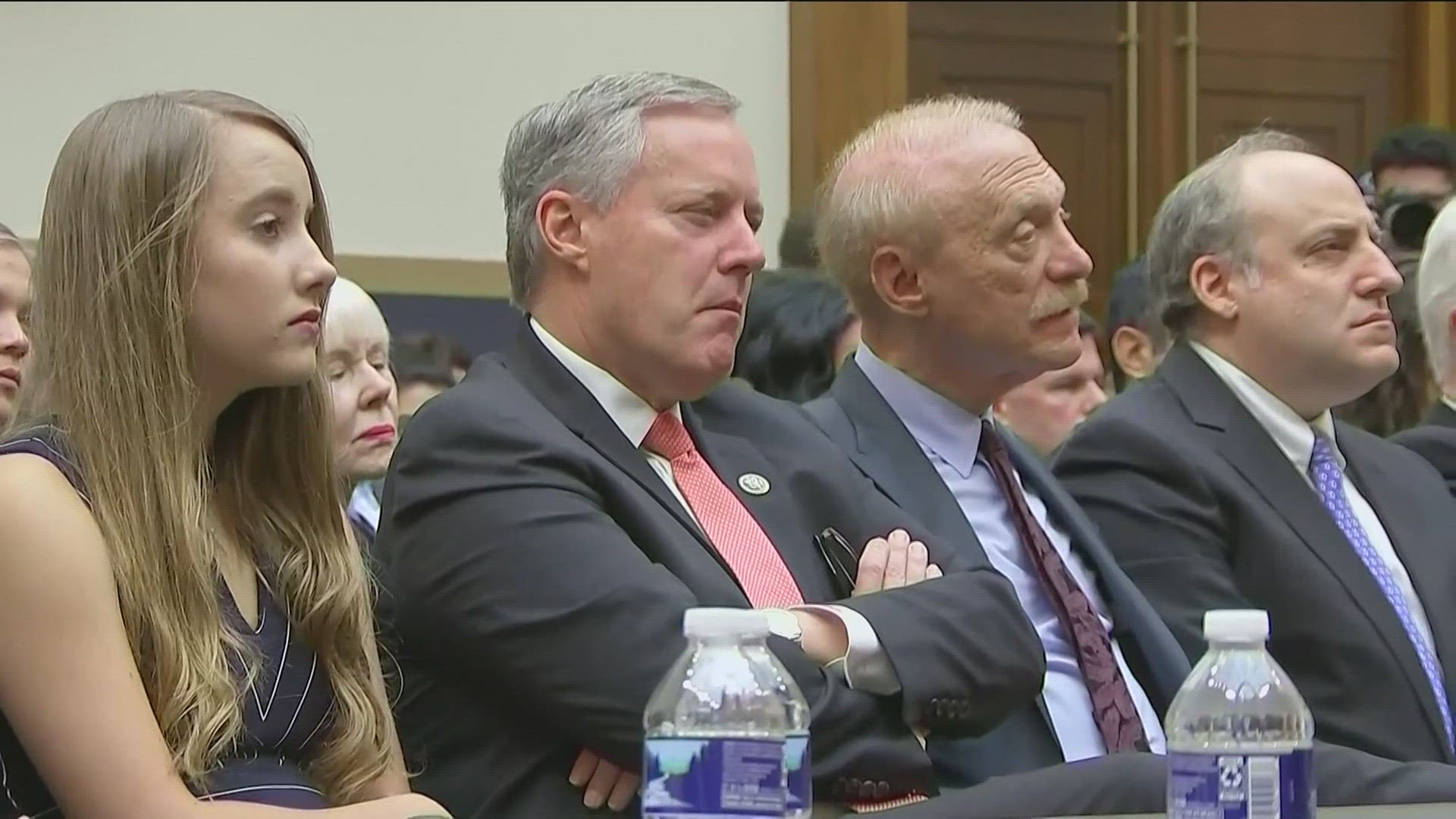ATLANTA — Former White House Chief of Staff Mark Meadows continued his efforts to move his 2020 Georgia election case to federal court, and the decision now rests with the 11th U.S. Circuit Court of Appeals.
Meadows was not present before the three-judge panel Friday morning as his attorneys and Fulton County prosecutors argued over where the former Trump official should face his charges. Friday's hearing lasted less than an hour.
RELATED: It's a 'silly notion' that Trump's Georgia case should pause for the election, Willis tells the AP
Meadows is attempting to invoke the federal removal statute, which allows federal officials facing state criminal charges to transfer their case to federal court if the acts were related to their federal role.
There are two key issues Chief Judge Bill Pryor, Judge Robin Rosenbaum, and Judge Nancy Abudu will consider — did Meadows act within the scope of his federal office following the election? And does the federal removal statute apply to former federal officers?
The three-judge panel appeared skeptical of the arguments from Meadows' lawyer Friday.
Did Meadows act within the scope of his office?
Both Abudu and Rosenbaum questioned Meadows' attorney, George J. Terwilliger III, over whether the acts described in the indictment fall within the scope of Meadows' White House role.
Meadows faces one count of violating Georgia's racketeering act and one count of solicitation of violation of oath by public officer. He took part in the infamous Jan. 2, 2021, phone call between former President Donald Trump and Georgia Secretary of State Brad Raffensperger.
Meadows also attempted to view the Cobb County absentee ballot signature match audit conducted by the GBI and the Georgia Secretary of State in December 2020. The audit was not open to the public, and prosecutors allege that several officials prevented Meadows from entering the space where the review was being done.
Terwilliger argued that the U.S. District Court in Atlanta improperly ruled against removal earlier this year. U.S. District Court Judge Steve C. Jones wrote in September that only "one of the eight overt acts (in the indictment) attributed to Meadows could have occurred within the scope of Meadows' office."
In previous hearings, Meadows and his legal team argued the chief of staff has a broad delegation of federal authority. Meadows testified in late August that his day-to-day responsibilities were nearly “24/7” and included everything from “informal” contacts with policymakers at the state level to consulting on matters of national security.
Both Rosenbaum and Abudu raised issues Friday about those arguments.
“According to him, it seems like everything was within his official duties, and that just cannot be right,” Rosenbaum said.
In filings and previous court hearings, the Fulton County District Attorney's Office has argued that Meadows' post-election actions were political in nature. They allege he violated the Hatch Act — a 1939 law prohibiting civil service employees, excluding the president and vice president, from engaging in political activity.
Chief Senior District Attorney Donald Wakeford argued Friday that Meadows failed to provide a "cogent explanation" for the limits of his office. The bar for removal, he said, was not met.
Terwilliger told the panel Friday that his team doesn't have to address alleged Hatch Act violations or other elements of the conspiracy to have the case moved. They only have to prove the conduct was connected to Meadows' role.
Does the removal statute apply to former federal officials?
The removal statute allows current federal officials to move their cases from state to federal court. However, the three-judge panel could consider if the same privilege extends to former officials when they make their Meadows decision.
The issues arose following an October ruling that vacated the conviction of Timothy Pate, a south Georgia man who described himself as an heir to the kingdom of Morocco. Pate filed liens against property owned by people he thought had wronged him — including a former Commissioner of the IRS and a former Secretary of the Treasury. Pate was then charged for filing false retaliatory liens against federal officials.
The court ruled 9-3 in Pate's favor, finding that a former civil servant didn't count as an officer or employee of the United States.
All three judges previously sided with Pate, and Pryor said Friday that he has a "hard time" seeing how the removal statute could apply to Meadows after pointing to one section of the law that says nothing about former federal officials.
However, the three-judge panel also expressed concern that preventing a former federal official from taking their case to federal court could create a chilling effect on federal officeholders and seekers.
Wakeford argued the Pate decision should be applied to Meadows' removal attempt and that chilling criminal actions are a good thing. The removal statute, he argued, doesn't apply to former federal officials. If a change is to be made to the statute, that is a job for Congress, not the court, Wakeford said.
"This is a case where there is no federal authority to protect," he said.
Terwilliger, a former United States Deputy Attorney General and acting United States Attorney General, said he would have made different decisions as a federal official if he knew that he might be charged in state court. He warned the panel of the "chaos" that could follow if state prosecutions of federal officials were allowed.
What's next?
It's unclear when the panel could issue its decision. The ruling could be appealed to the U.S. Supreme Court.
Meadows, Trump and 17 others were indicted by a Fulton County grand jury in August. Four other defendants are seeking to remove their cases to federal court. Hearings for Jeffrey Clark, Cathy Latham, David Shafer, and Shawn Still have not been set.
Four defendants have pleaded guilty. Fulton prosecutors are seeking an August 2024 trial date for the remaining 15 defendants.

